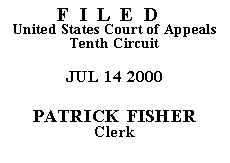

| UNITED STATES OF AMERICA,
Plaintiff-Appellee, Defendant-Appellant. |
No. 99-2343
(D.C. No. CIV-98-1474-LH) |
Enrique Chavez-Ramos, appearing pro se, appeals from the denial of his petition for writ of habeas corpus filed pursuant to 28 U.S.C. § 2255, and seeks a certificate of appealabilty, see 28 U.S.C. § 2253(c)(1)(B). We deny his request for the certificate and dismiss his appeal.
Mr. Chavez-Ramos pled guilty in federal court to several felonies, including conspiracy to distribute more than 1000 kilograms of marijuana, possession of more than 100 kilograms of marijuana with intent to distribute, and money laundering. His plea agreement stated that the statutory mandatory minimum sentence for the conspiracy charge was ten years. The agreement also contemplated the possibility of safety valve relief under 18 U.S.C. § 3553(f)(1), contingent upon his not having more than one criminal history point under the Federal Sentencing Guidelines.
When the presentence report was completed, the Probation Office concluded that Mr. Chavez-Ramos' two prior criminal convictions for driving while under the influence should count in computing Mr. Chavez-Ramos' criminal history score. As the result of these two convictions, the Probation Office concluded that Mr. Chavez-Ramos failed to meet the criteria for safety valve relief. At his sentencing hearing, Mr. Chavez-Ramos contended his first DUI conviction should not have been included in his criminal history score because it was a first offense and the equivalent of a minor traffic violation. The court rejected this argument, and sentenced Mr. Chavez-Ramos to 125 months in prison.
Mr. Chavez-Ramos appealed his sentence on the same grounds he presented to the district court. His attorney filed an appellate brief pursuant to Anders v. California, 386 U.S. 738 (1967), and moved to withdraw on the grounds that the claims brought on appeal were frivolous. We granted the motion and dismissed the appeal, finding it contrary to controlling case law. See United States v. Chavez-Ramos, No. 97-2390, 1999 WL 7727 (10th Cir. Jan. 11, 1999) ("Convictions for driving . . . under the influence of alcohol count toward the criminal history and are not considered minor infractions.") (citing U.S.S.G. § 4A1.2 Commentary, Application note 5; United States v. Walling, 974 F.2d 140, 142 (10th Cir. 1992)).
Mr. Chavez-Ramos then filed this petition for habeas corpus relief asserting three claims: (1) the United States breached his plea agreement, violating his due process rights; (2) the United States utilized his criminal history without fulfilling its burden of proof; and (3) his attorney provided ineffective assistance of counsel. The magistrate judge issued a report recommending the petition be denied on the merits with respect to those issues that had not been decided on direct appeal. The district court agreed, adopted the magistrate's report, and denied Mr. Chavez-Ramos' request for a certificate of appealability.
In his appeal to this court, Mr. Chavez-Ramos raises only the ineffective assistance of counsel claim. He argues he is entitled to a certificate of appealability because the magistrate's findings and conclusions were in error, denying him due process. A certificate of appealability may issue only if the applicant has made a substantial showing of the denial of a constitutional right. See 28 U.S.C. § 2253(c)(2). Mr. Chavez-Ramos has failed to make this showing.
Having reviewed the entire record, we are convinced the magistrate's report contains a reasoned and accurate analysis of Mr. Chavez-Ramos' claims. We also note the earlier Tenth Circuit panel's disposition of Mr. Chavez-Ramos' direct appeal. Mr. Chavez-Ramos' sentence was correct and was mandated by the Federal Sentencing Guidelines. The language and terms of the plea agreement he signed are unambiguous. Because the plea agreement was proper and unambiguous and the sentence was correct, Mr. Chavez-Ramos' counsel was not ineffective in his handling of the plea.(1) The district court's denial of Mr. Chavez-Ramos' petition on this basis therefore did not deny him any constitutional right.
Accordingly, Mr. Chavez-Ramos' request for a certificate of appealability is DENIED and his appeal is DISMISSED.
ENTERED FOR THE COURT
Stephanie K. Seymour
Chief Judge
*.This order and judgment is not binding precedent, except under the doctrines of law of the case, res judicata, or collateral estoppel. The court generally disfavors the citation of orders and judgments; nevertheless, an order and judgment may be cited under the terms and conditions of 10th Cir. R. 36.3.
1.Mr. Chavez-Ramos also argues, for the first time on appeal, that his counsel was ineffective for failing to challenge the validity of his DUI convictions. In the absence of extraordinary circumstances, we will not consider issues not raised in the district court. See Smith v. Secretary of New Mexico Dept. of Corrections, 50 F.3d 801, 814 n.22 (10th Cir. 1995). We are offered no extraordinary circumstances here, and we decline to consider the issue.